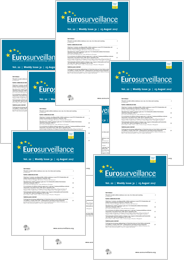- Home
- Weekly releases (1997–2007)
- Previous Issues
- Volume 6, Issue 2, 10/Jan/2002
Weekly releases (1997–2007) - Volume 6, Issue 2, 10 January 2002
Volume 6, Issue 2, 2002
- Articles
-
-
-
Implications for Europe of high prevalence of HIV drug resistance in the United States
More LessOver 16 drugs are now available for use against HIV, broadly comprising three classes of agent. Their use, in combination, has had a dramatic impact in reducing disease progression. Successful treatment is increasingly defined as the maintenance of plasma viral RNA load at undetectable levels. Reasons for ‘virological failure’ (viral rebound) on treatment are many, but perhaps the single most important factor is suboptimal drug compliance.
-
-
-
The International Network of Paediatric Surveillance Units (INoPSU) – increasing European contribution to the surveillance of rare paediatric disease
More LessRare diseases and infections are, paradoxically, a numerically important cause of morbidity and mortality in childhood. Individually uncommon, together they number thousands, and many result in very poor outcome prognosis. The difficulty in recognising rare diseases can result in delayed diagnosis, increasing the risk of preventable complications or death, and transmission. Emerging infections will initially be rare and may remain undetected, with the infection spreading extensively before action is taken.
-
-
-
Variant Creutzfeldt-Jakob disease in the United Kingdom
More LessThe Department of Health in the United Kingdom has issued the latest figures on known cases of Creutzfeldt-Jakob disease, including cases of variant Creutzfeldt-Jakob disease (vCJD), the form of the disease linked to bovine spongiform encephalopathy. To 7 January 2002, 104 deaths from vCJD have occurred in the United Kingdom
-
-
-
Conjugate serogroup C meningococcal vaccine use extended in the United Kingdom
More LessThe United Kingdom (UK) Joint Committee on Vaccination and Immunisation (JCVI) has reviewed the epidemiology of group C infection in the population aged 20 years and over and recommended that immunisation should be made available for individuals aged 20-24 years (born after 7 January 1977) (1). The vaccine has already been offered to people who are under 20 years of age (2). This decision comes following successful reduction in disease in the UK of children and young people offered the conjugate meningococcal C vaccine (Men C vaccine).
-
-
-
New issue of EpiNorth now online
More LessThe latest issue of EpiNorth, the infectious disease bulletin of northern Europe, is now available online in English and Russian at www.epinorth.org. Articles in this issue include the following.
-
-
-
October issue of Eurosurveillance now available online
More LessThe October issue of the monthly bulletin Eurosurveillance, also funded by the European Commission, is now available on the internet (in English and French) at http://www.eurosurveillance.org/.
-
-
Most Read This Month

-
-
Chikungunya in north-eastern Italy: a summing up of the outbreak
R Angelini , A C Finarelli , P Angelini , C Po , K Petropulacos , G Silvi , P Macini , C Fortuna , G Venturi , F Magurano , C Fiorentini , A Marchi , E Benedetti , P Bucci , S Boros , R Romi , G Majori , M G Ciufolini , L Nicoletti , G Rezza and A Cassone
-
- More Less


